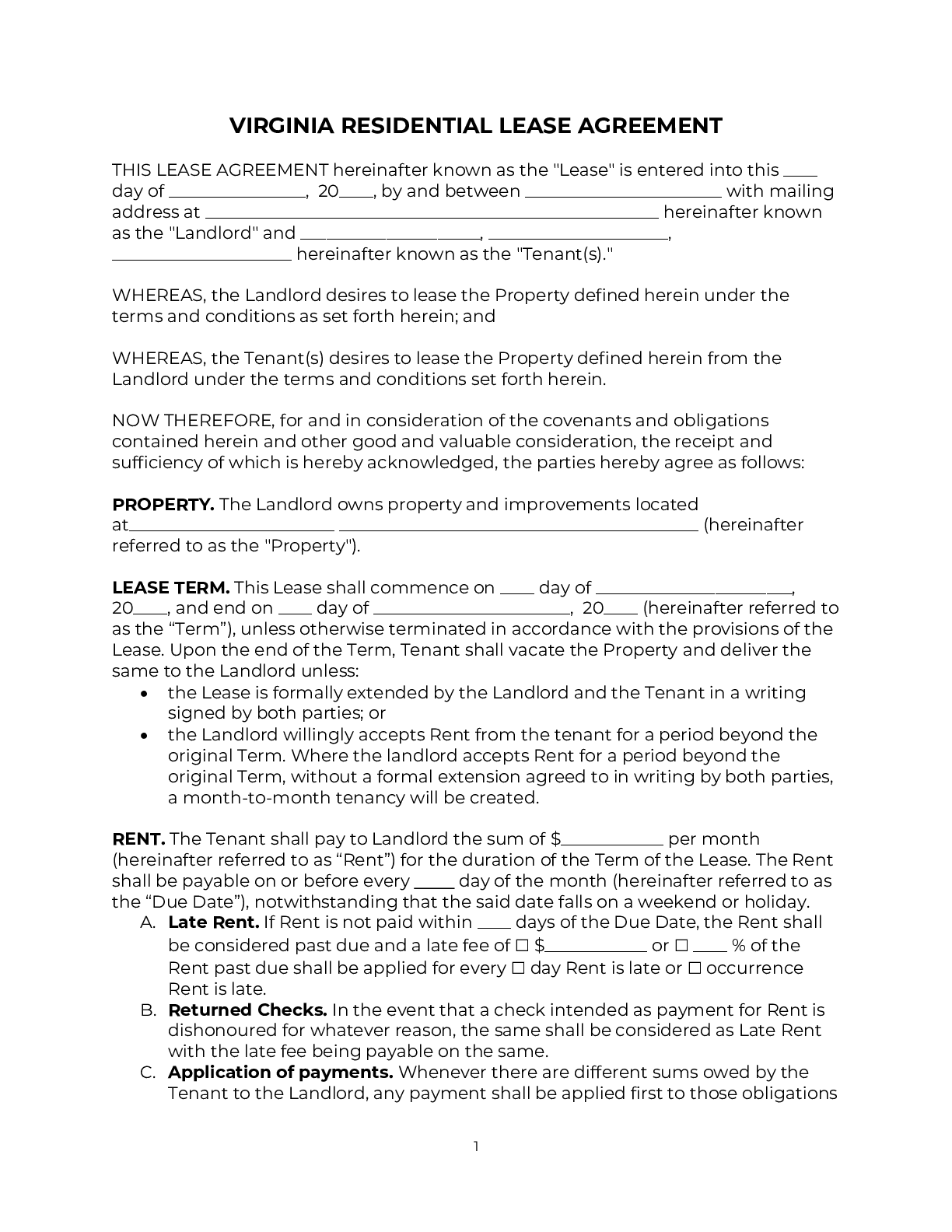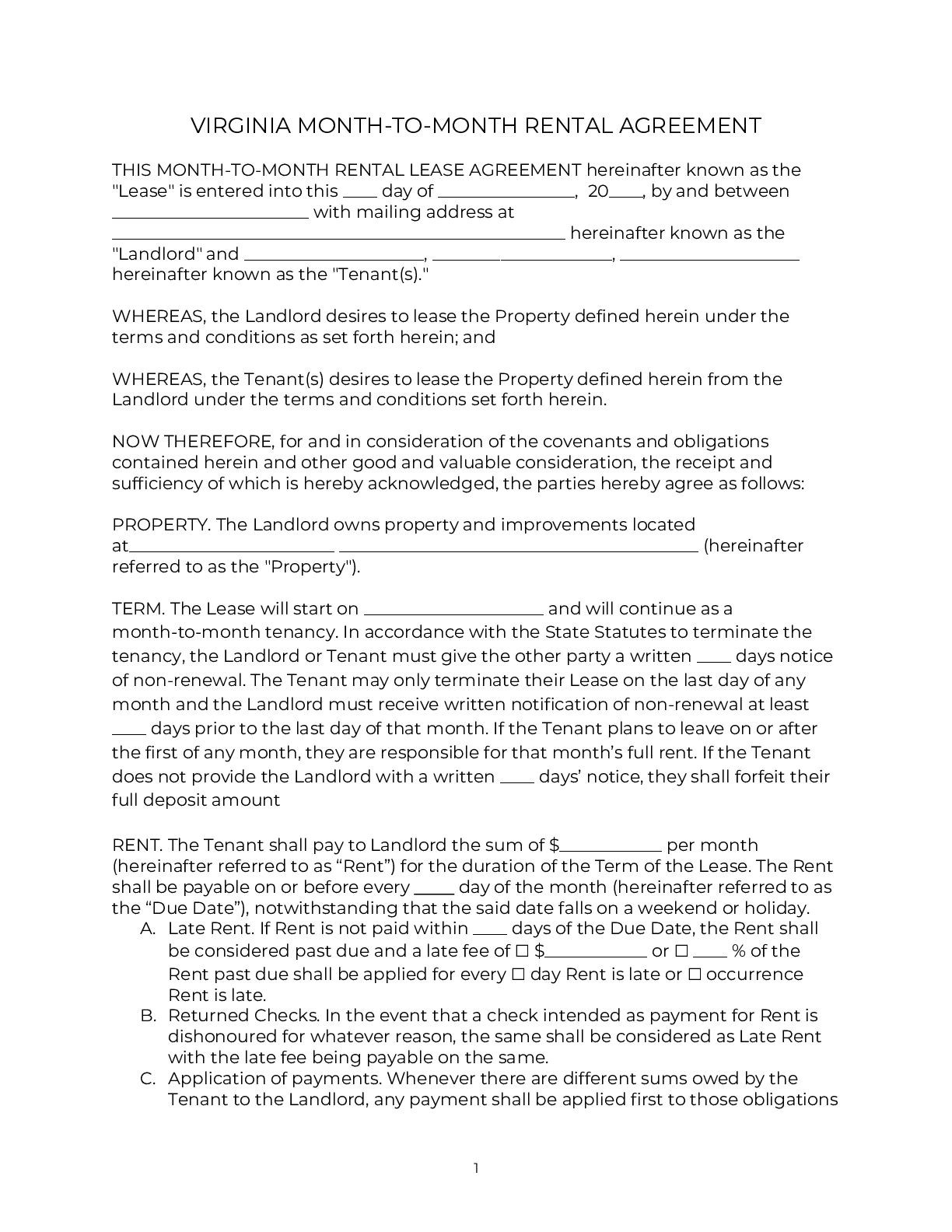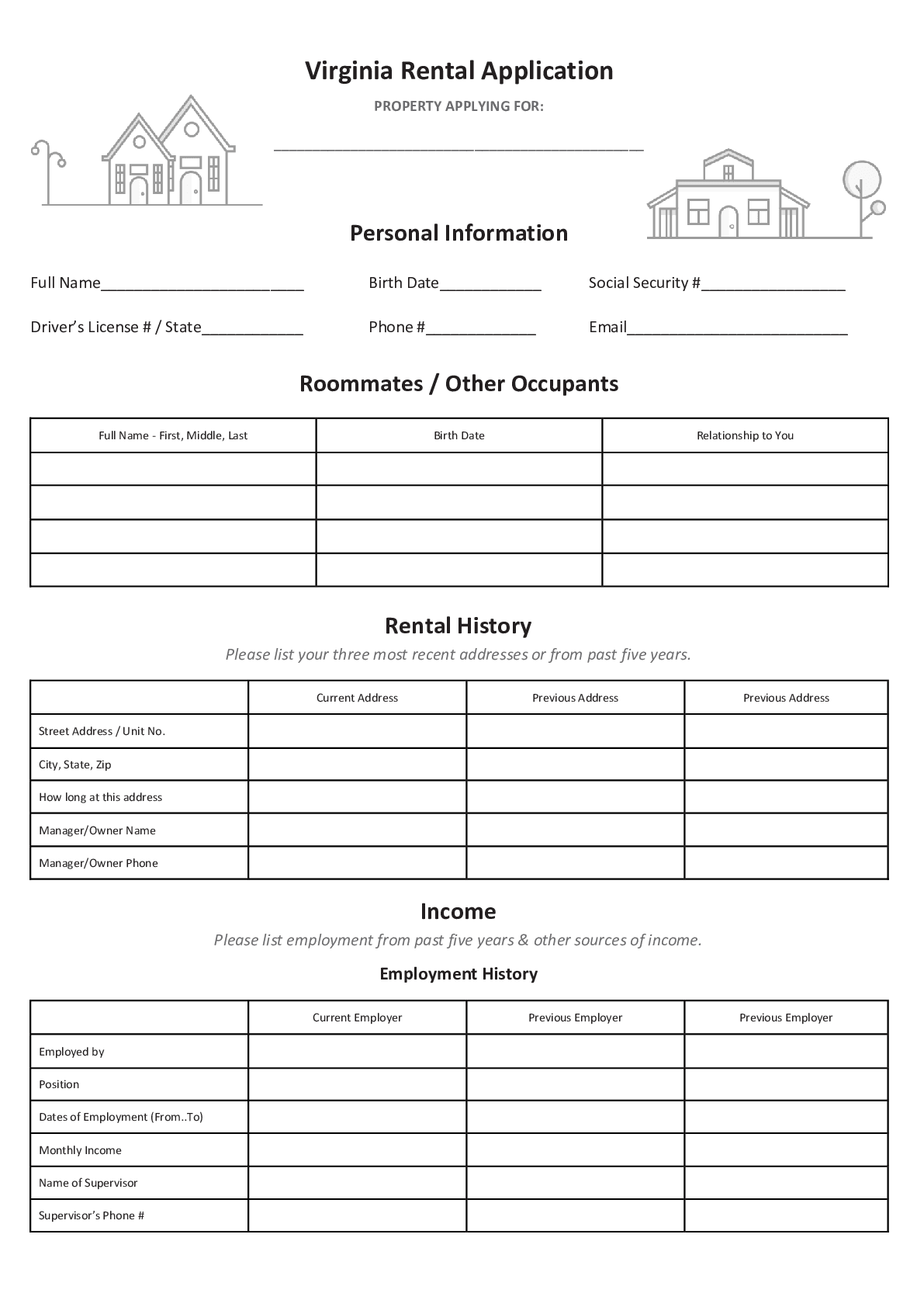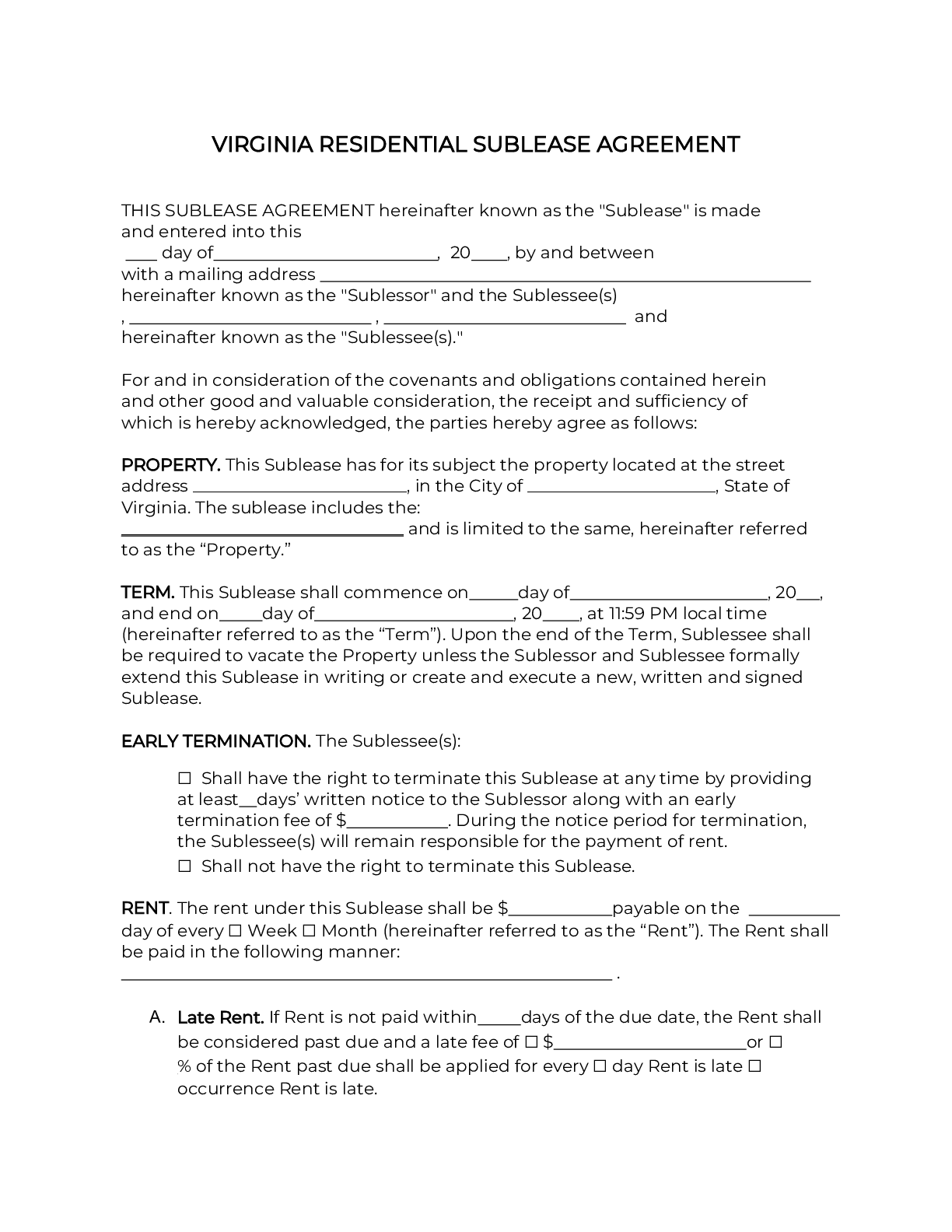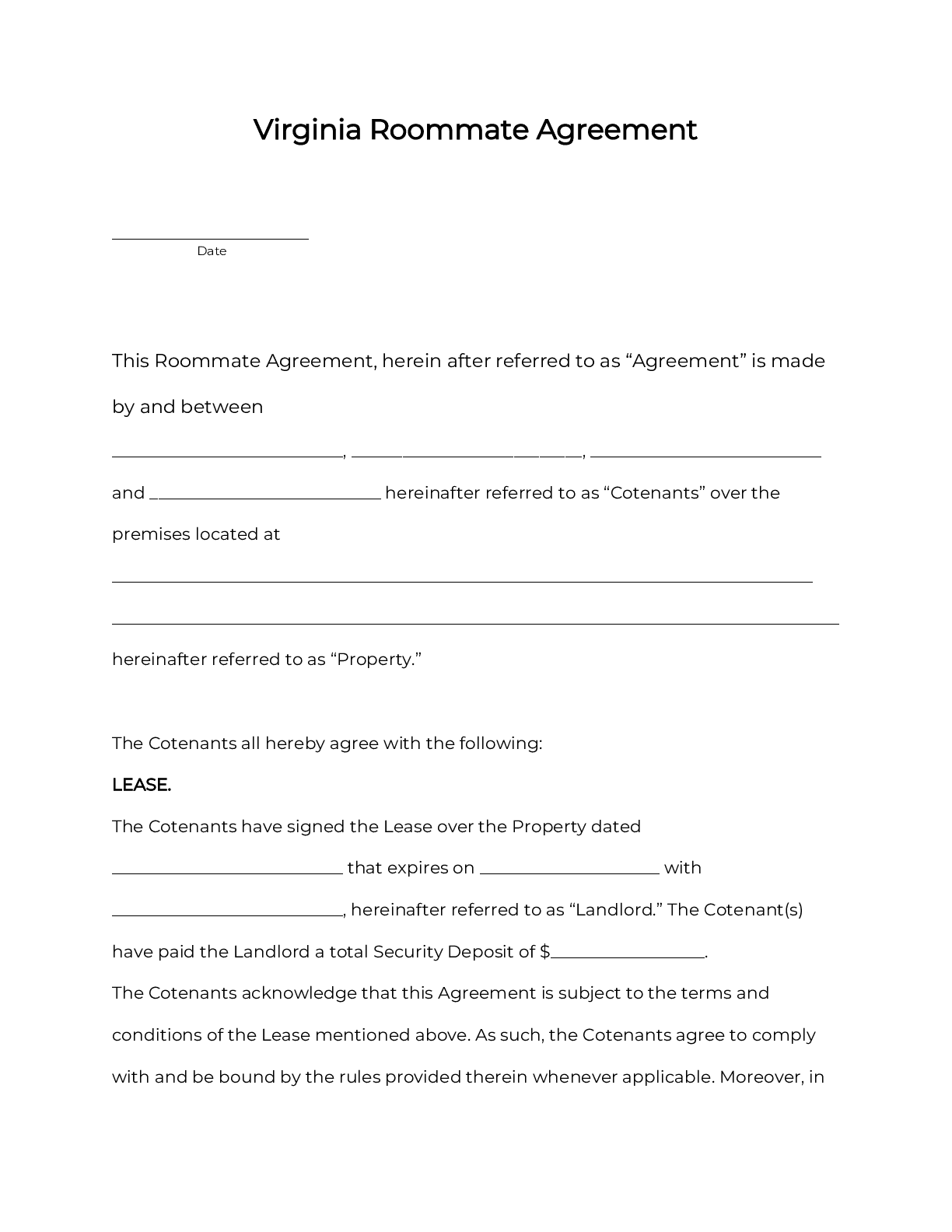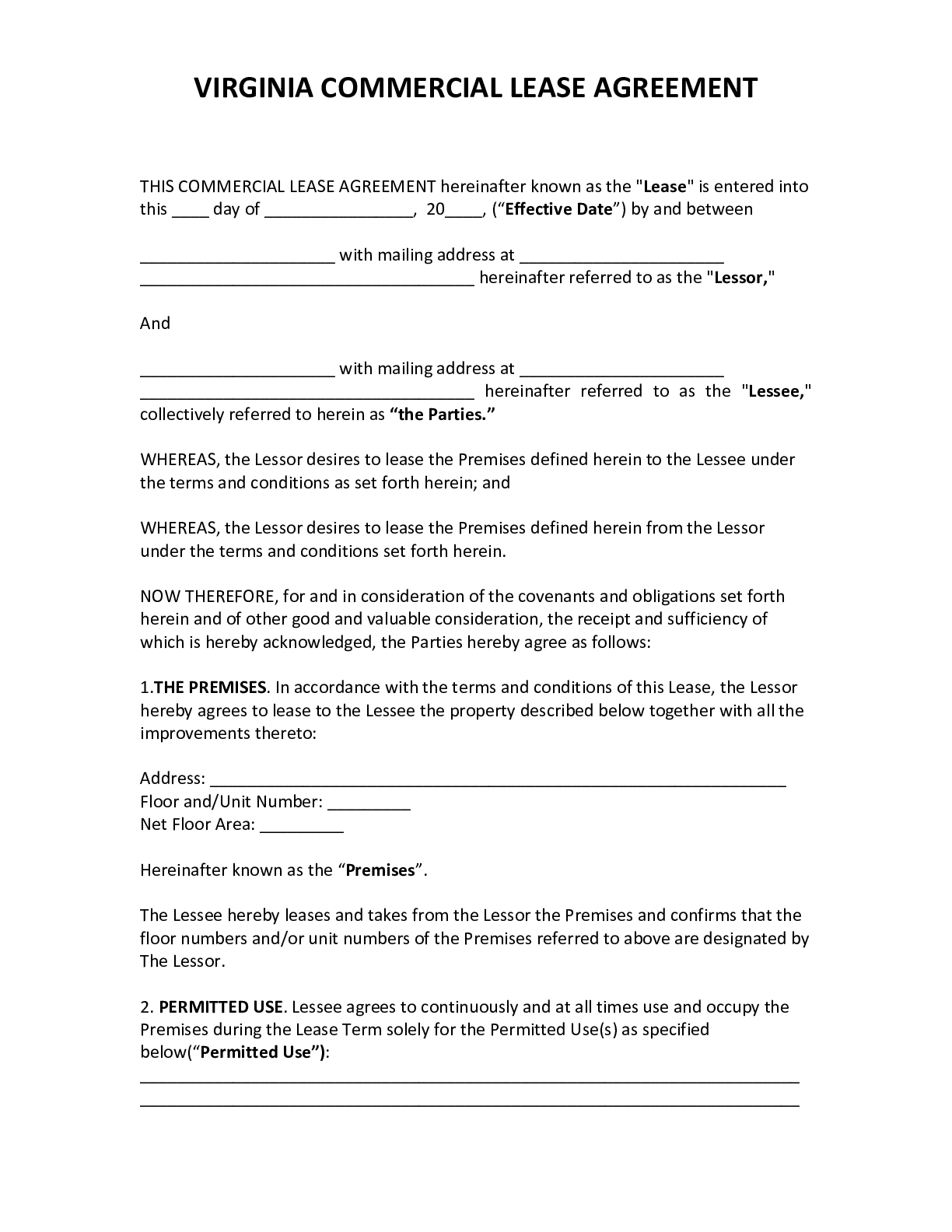A Virginia rental agreement is a legal contract between a landlord overseeing a rental property and a tenant using the property. Virginia landlord-tenant law governs and regulates these agreements.
Virginia Rental Agreement Types
A Virginia roommate agreement is a legal contract between two or more people (“co-tenants”) who share a rental property according to rules they set, including for things like splitting the rent. This agreement binds the co-tenants living together, and doesn’t include the landlord.
Common Residential Rental Agreements in Virginia
- Virginia REALTORS® Residential Lease – This template is for use by members of the Virginia REALTORS®. It is in common use for residential rental properties throughout Virginia. It covers a number of landlord-tenant topics in detail, including noise, smoke and carbon monoxide protection, and even structural considerations like defective drywall.
Virginia Required Lease Disclosures
- Landlord’s Name and Address (required for all leases) – Virginia leases must contain the name and address of the landlord or authorized agent. This helps ensure smooth communication and payment of rent in the event of any unusual situations. Typically includes additional contact information for the landlord and authorized agents, such as phone numbers and email addresses.
- Move-In Checklist (required for all leases) – Virginia leases must include a move-in checklist to inventory the condition of the property, completed within 5 days of move-in. Deductions from a security deposit may be illegal without a properly executed checklist.
- Statement of Tenant Rights and Responsibilities (required for all leases) – Landlords must accompany every new lease with a Statement of Tenant Rights and Responsibilities produced by the state Department of Housing and Community Development.
- Fee Disclosure Statement (required for all leases) – Landlords must disclose the total rent and all fees which may be charged under the lease. This disclosure must come together with a statement that the landlord can’t charge fees which aren’t in the disclosure, unless agreed later in writing via addendum.
- Shared Utility Arrangements (required for some leases) – Virginia leases which share a utility meter with other units must disclose how they divide utility costs up. This ensures tenants receive fair charges and understand what uses contribute to their bill.
- Tenant Displacement Notice (required for some leases) – Virginia landlords must provide a disclosure when they plan to displace tenants within six months of move-in due. This disclosure is required for upcoming property demolition, rehabilitation, or conversion.
- Military Air Installation Disclosure (required for some leases) – Virginia rentals must disclose a risk for noise disturbances and/or accidents, when located near a relevant military air installation.
- Defective Drywall Disclosure (required for some leases) – Virginia leases must disclose any knowledge of potentially hazardous defective drywall.
- Methamphetamine Contamination Disclosure (required for some leases) – Virginia landlords must disclose any knowledge relating to methamphetamine manufacturing or contamination on rental property.
- Lead-Based Paint Disclosure (required for some leases) – Landlords must provide an EPA-approved disclosure and informational pamphlet to tenants renting any property built before 1978.
To learn more about required disclosures in Virginia, click here. Some Virginia cities, like Virginia Beach, may require additional disclosures. Local laws apply in addition to state laws.
Virginia Landlord Tenant Laws
- Warranty of Habitability – Virginia landlords can only rent out habitable property. This means providing certain basic health and safety features like heat, plumbing, and electricity. Landlords must repair any issues within 14-21 days after proper notice from the tenant. Failure to repair lets a tenant sue the landlord, terminate the lease, or (in some cases) make repairs and deduct from the rent. Virginia prohibits withholding rent.
- Evictions – Virginia landlords may evict tenants for a number of reasons including, but not limited to failure to pay rent, a violation of a leasing term, or committing an illegal act. Landlords must provide tenants with prior notice to pay, comply or quit, depending on the type of eviction, which triggers different notice periods. Evictions may take around 2 to 4 months. Virginia also has an Eviction Diversion Pilot Program for certain low-income tenants.
- Security Deposits – Virginia limits a security deposit to two months’ rent. When the lease ends, the landlord has 45 days to return any unused portion of a tenant’s deposit.
- Lease Termination – Virginia allows tenants to end a month-to-month lease with 30 days of advance notice. Terminating a fixed-term lease early usually requires active military duty, landlord harassment, uninhabitable property, failure to make a mandatory disclosure, or domestic abuse.
- Rent Increases and Fees – Virginia does not limit the amount or timing of a rent increase. Most fees charged to a tenant must be agreed in the lease to be enforceable. Some are limited by law, including late fees (maximum 10% of the monthly rent) and bounced check fees (maximum $50).
- Landlord Entry – Virginia landlords may enter rental property at reasonable times for reasonable business purposes, like maintenance, inspections, and property showings. Except in emergencies, the landlord must give at least 72 hours of advance notice. Virginia also requires the advance notice to specify the latest date (within the next 14 days) that the entry will occur.
- Settling Legal Disputes – Virginia lets small claims courts hear landlord-tenant disputes, as long as the amount in controversy is under $5,000. Unlike many states, Virginia allows evictions in small claims, although regular civil courts are also always an option.
To learn more about landlord tenant laws in Virginia, click here.
Sources
- 1 Va. Code § 55.1-1204(B)
-
A landlord shall offer a prospective tenant a written rental agreement containing the terms governing the rental of the dwelling unit and setting forth the terms and conditions of the landlord-tenant relationship and shall provide with it the statement of tenant rights and responsibilities developed by the Department of Housing and Community Development and posted on its website pursuant to § 36-139. The parties to a written rental agreement shall sign the form developed by the Department of Housing and Community Development and posted on its website pursuant to § 36-139 acknowledging that the tenant has received from the landlord the statement of tenant rights and responsibilities. The written rental agreement shall be effective upon the date signed by the parties.
If a tenant fails to sign the form available pursuant to this subsection, the landlord shall record the date or dates on which he provided the form to the tenant and the fact that the tenant failed to sign such form. Subsequent to the effective date of the tenancy, a landlord may, but shall not be required to, provide a tenant with and allow such tenant an opportunity to sign the form described pursuant to this subsection. The form shall be current as of the date of delivery.
Source Link - 2 Va. Code § 55.1-1204.1
-
A landlord shall provide, beginning on the first page of the written rental agreement, a description of any rent and fees to be charged to the tenant in addition to the periodic rent. Immediately above the list of fees, the written rental agreement shall state: No fee shall be collected unless it is listed below or incorporated into this agreement by way of a separate addendum after execution of this rental agreement.
Source Link - 3 Va. Code § 55.1-1204(H)
-
The landlord shall provide a copy of the signed written rental agreement and the statement of tenant rights and responsibilities to the tenant within 10 business days of the effective date of the written rental agreement. The failure of the landlord to deliver such a rental agreement and statement shall not affect the validity of the agreement. However, the landlord shall not file or maintain an action, including any summons for unlawful detainer, against the tenant in a court of law for any alleged lease violation until he has provided the tenant with the statement of tenant rights and responsibilities.The landlord shall provide the tenant with an additional hard copy of such tenant’s rental agreement once per year upon request or shall maintain such rental agreement in an electronic format that can be easily accessed by or shared with the tenant upon request. Any additional electronic copy of a tenant’s rental agreement provided pursuant to this subsection shall be provided by the landlord at no charge to the tenant.
Source Link - 4 Va. Code § 55.1-1262
-
(Expires July 1, 2025) Eviction Diversion Pilot Program; process; court-ordered payment plan.
A. A tenant in an unlawful detainer case shall be eligible to participate in the Program if he:
1. Appears in court on the first docket call of the case and requests to have the case referred into the Program;
2. Pays to the landlord or into the court at least 25 percent of the amount due on the unlawful detainer as amended on the first docket call of the case;
3. Provides sworn testimony that he is employed and has sufficient funds to make the payments under the court payment plan, or otherwise has sufficient funds to make such payments;
4. Provides sworn testimony explaining the reasons for being unable to make rental payments as contracted for in the rental agreement;
5. Has not been late within the last 12 months in payment of rent as contracted for in the rental agreement at the rate of either (i) more than two times in six months or (ii) more than three times in 12 months;
6. Has not exercised the right of redemption pursuant to § 55.1-1250 within the last six months; and
7. Has not participated in an eviction diversion program within the last 12 months.
B. The court shall direct an eligible tenant pursuant to subsection A and his landlord to participate in the Program and to enter into a court-ordered payment plan. The court shall provide for a continuance of the case on the docket of the general district court in which the unlawful detainer action is filed to allow for full payment under the plan. The court-ordered payment plan shall be based on a payment agreement entered into by the landlord and tenant, on a form provided by the Executive Secretary, and shall contain the following provisions:
1. All payments shall be (i) made to the landlord; (ii) paid by cashier’s check, certified check, or money order; and (iii) received by the landlord on or before the fifth day of each month included in the plan;
2. The remaining payments of the amounts on the amended unlawful detainer after the first payments made on the first docket call of the case shall be paid on the following schedule: (i) 25 percent due by the fifth day of the month following the initial court hearing date, (ii) 25 percent due by the fifth day of the second month following the initial court hearing date, and (iii) the final payment of 25 percent due by the fifth day of the third month following the initial court hearing date; and
3. All rental payments shall continue to be made by the tenant to the landlord as contracted for in the rental agreement within five days of the due date established by the rental agreement each month during the course of the court-ordered payment plan.
C. If the tenant makes all payments in accordance with the court-ordered payment plan, the judge shall dismiss the unlawful detainer as being satisfied.
D. If the tenant fails to make a payment under the court-ordered payment plan or to keep current any monthly rental payments to the landlord as contracted for in the rental agreement within five days of the due date established by the rental agreement, the landlord shall submit to the general district court clerk a written notice, on a form provided by the Executive Secretary, that the tenant has failed to make payments in accordance with the plan. A copy of such written notice shall be given to the tenant in accordance with § 55.1-1202.
The court shall enter an order of possession without further hearings or proceedings, unless the tenant files an affidavit with the court within 10 days of the date of such notice stating that the current rent has in fact been paid and that the landlord has not properly acknowledged payment of such rent. A copy of such affidavit shall be given to the landlord in accordance with § 55.1-1202.The landlord may seek a money judgement for final rent and damages pursuant to subsection B of § 8.01-128.
E. Nothing in this section shall be construed to limit (i) the landlord from filing an unlawful detainer for a non-rent violation against the tenant while such tenant is participating in the Program or (ii) the landlord and tenant from entering into a voluntary payment agreement outside the provisions of this section.
Source Link - 5 Va. Code § 55.1-1229(A)(4)
-
The landlord may enter the dwelling unit without consent of the tenant in case of emergency. The landlord shall not abuse the right of access or use it to harass the tenant. Except in case of emergency or if it is impractical to do so, the landlord shall give the tenant notice of his intent to enter and may enter only at reasonable times. Unless impractical to do so, the landlord shall give the tenant at least 72 hours’ notice of routine maintenance to be performed that has not been requested by the tenant. Such routine maintenance shall be performed within 14 days of delivery of the notice to the tenant, and the notice shall state the last date on which the maintenance may possibly be performed. If the tenant makes a request for maintenance, the landlord is not required to provide notice to the tenant.
Source Link




